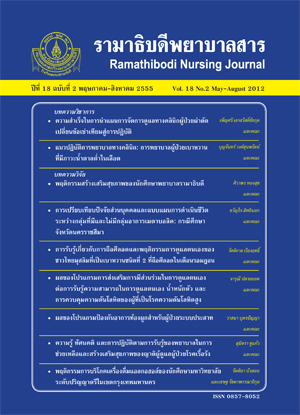ผลของโปรแกรมป้องกันอาการท้องผูกสำหรับผู้ป่วยระบบประสาท
Main Article Content
Abstract
บทคัดย่อ
การวิจัยกึ่งทดลองครั้งนี้มีวัตถุประสงค์ เพื่อศึกษาผลของโปรแกรมป้องกันอาการ ท้องผูกต่ออัตราการเกิดท้องผูก และความรุนแรงของอาการท้องผูกในผู้ป่วยระบบประสาท โดยใช้ หลักการทางสรีรวิทยาเป็นกรอบแนวคิดในการศึกษา กลุ่มตัวอย่างคือ ผู้ป่วยที่รับไว้ดูแลใน แผนกศัลยกรรม โรงพยาบาลแพร่ ระหว่างเดือนมกราคม ถึงมิถุนายน พ.ศ. 2553 คัดเลือกแบบ เจาะจงตามคุณสมบัติที่กำหนดคือ เป็นผู้ที่มีอายุ 15 ปีขึ้นไป ได้รับการวินิจฉัยว่าเป็นโรคทางระบบประสาท อยู่ในระยะฟื้นฟู สามารถช่วยเหลือตนเองได้บางส่วนหรือไม่สามารถช่วยเหลือตนเองได้เลย ได้รับอาหารเหลวทางสายให้อาหารหรือรับประทานอาหารทางปาก ไม่อยู่ในระยะที่ต้องจำกัดนํ้า ไม่เป็นผู้ที่มีอาการท้องผูกที่ทราบสาเหตุว่าเป็นผลจากโรคหรือความผิดปกติอื่นๆ ผู้ป่วยและญาติยินดีเข้าร่วมการวิจัย แบ่งกลุ่มตามลำดับการเข้ารับการรักษาในโรงพยาบาล เป็นกลุ่มควบคุมได้รับการพยาบาลตามปกติ และกลุ่มทดลองได้รับโปรแกรมป้องกันอาการท้องผูก กลุ่มละ 40 ราย โปรแกรมประกอบด้วย การให้ข้อมูล การส่งเสริมการขับถ่ายอุจจาระ อาหาร นํ้า ส่งเสริมการเคลื่อนไหวร่างกายและการนวดหน้าท้อง เก็บรวบรวมข้อมูลโดยใช้แบบบันทึกข้อมูล 4 ชุด วิเคราะห์ข้อมูลโดยใช้สถิติบรรยาย สถิติไคสแควร์ สถิติที สถิติแมนวิทนีย์ กำหนดนัยสำคัญ ที่ระดับ .05 ผลการวิจัยพบว่าในช่วงเริ่มต้นการศึกษา ผู้ป่วยระบบประสาทในกลุ่มทดลองมีข้อมูล ส่วนบุคคลไม่แตกต่างจากกลุ่มควบคุมอย่างมีนัยสำคัญทางสถิติ แต่มีความเสี่ยงต่อการเกิดอาการ ท้องผูกและมีประวัติการได้รับยาที่อาจมีผลต่ออาการท้องผูกแตกต่างกันอย่างมีนัยสำคัญทางสถิติ ภายหลังได้รับโปรแกรมป้องกันอาการท้องผูกพบว่ากลุ่มทดลองมีอัตราการเกิดอาการ ท้องผูกและระดับความรุนแรงของการเกิดอาการท้องผูกน้อยกว่ากลุ่มควบคุมอย่างมีนัยสำคัญทางสถิติ เมื่อวิเคราะห์แยกตามกลุ่มความเสี่ยงต่ออาการท้องผูก พบว่าเฉพาะกลุ่มที่มีความเสี่ยงปานกลาง กลุ่มทดลองมีอัตราการเกิดอาการท้องผูกและความรุนแรงของการเกิดอาการท้องผูก น้อยกว่ากลุ่มควบคุมอย่างมีนัยสำคัญทางสถิติ ดังนั้น โปรแกรมป้องกันการเกิดอาการท้องผูก จึงสมควรนำไปใช้ในการกำหนดแนวปฏิบัติในการดูแลผู้ป่วยระบบประสาท เพื่อความสุขสบาย และส่งเสริมการฟื้นหายของผู้ป่วยต่อไป
คำสำคัญ: อาการท้องผูก โปรแกรมป้องกันอาการท้องผูก ผู้ป่วยระบบประสาท
Abstract
The purpose of this study was to examine the effects of a constipation prevention program on incidence and severity of constipation in neurological patients. The sample included 80 patients who were admitted to three surgery wards, at Phrae Hospital, Thailand, from January to June 2010. They were recruited if they met the inclusion criteria including: being 15 years old and over, having neurological conditions with or without brain surgery, being in the recovery stage, having enteral feeding without water restriction, not having known cause of constipation, and being willing to participate in the study. Forty participants who were assigned to the control group received usual care; the remaining 40 participants who were assigned to the experimental group received the constipation prevention program since the time of hospitalization. The program consisted of providing patient education, supporting of habitual defecation practice, providing high dietary fiber food and water intake, and abdominal massage. The researcher performed daily data collection throughout the study period. The data were analyzed using descriptive statistics, chi-square test, Independent t-test, and Mann-Whitney U test. Sample characteristics of the control and the experimental groups were not statistically different, whereas the risk of constipation and history of drug use that might influence constipation were significantly different. After receiving the intervention program, the experimental group had lower incidence and severity of constipation than the control group. When comparing the two groups based on their risk of constipation, only the experimental group with moderate risk had a lower incidence and severity of constipation than the control group. Thus, the constipation prevention program can be implemented in clinical nursing practice for neurological patients.
Keywords: Constipation, Constipation Prevention Program, Neurological patient
Article Details
บทความ ข้อมูล เนื้อหา รูปภาพ ฯลฯ ที่ได้รับการตีพิมพ์ในรามาธิบดีพยาบาลสาร ถือเป็นลิขสิทธิ์ของวารสาร หากบุคคลหรือหน่วยงานใดต้องการนำทั้งหมดหรือส่วนหนึ่งส่วนใดไปเผยแพร่หรือเพื่อกระทำการใด ใด จะต้องได้รับอนุญาตเป็นลายลักษณ์อักษรจากรามาธิบดีพยาบาลสารก่อนเท่านั้น


